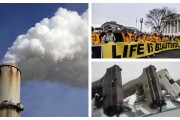
Jamie Dimon said Texas risks undermining its business-friendly reputation with laws designed to punish Wall Street banks for policies that limit work with the gun and fossil-fuel industries.
"Texas is a wonderful, welcoming place" for business, the longtime JPMorgan Chase chief executive officer said Wednesday in an interview in Frisco, Texas. "The government's done a magnificent job and that's why you have the growth, why unemployment is so low, why people are moving companies and jobs here."
"I think it's a mistake to damage it even a little way," said Dimon, who runs the nation's largest bank.
Texas Republicans picked a fight with Wall Street over investment policies on firearms and oil in 2021, passing two laws that restricted public contracts with financial firms that "boycott" the fossil fuel sector or "discriminate" against gunmakers. The laws have upended bond deals and led to multiple probes into corporate policies, the latest of which was launched by Attorney General Ken Paxton last month to review 10 financial companies, including JPMorgan.
"We don't discriminate or boycott anybody, neither for political affiliation nor for anything else," Dimon said, marking his most direct public comments on the issue. "We do make risk, legal, credit and reputational decisions, which is our legal right — and my obligation as chairman and CEO of JPMorgan Chase."
Texas officials like to tout the state's rapid economic and population growth, which they say is a testament to its pro-business policies. Just last month, Gov. Greg Abbott described his state as having "the best business climate and strongest workforce in the nation."
The bank isn't pulling back on Texas. On Wednesday, JPMorgan announced that it intends to hire 1,000 new local bankers across the country, including in Texas, by 2025 to support small-business clients. That's double an earlier plan to add 500 by next year. The increased commitment comes as the firm hosts a summit for small-business owners outside of Dallas, featuring speakers like actor Matthew McConaughey and Dallas Mavericks owner Mark Cuban.
In a letter last month, Paxton's office said it was reviewing the compliance of 10 financial firms, including U.S. banking behemoths JPMorgan, Bank of America and Wells Fargo, over whether they violate the energy law. His office cited their membership in groups seeking to reduce greenhouse gas emissions. JPMorgan, like many of the other banks under review, has maintained it doesn't boycott fossil fuels or discriminate against firearms companies.
The bank is the largest financier of both fossil fuels and clean energy in the world, according to Trish Wexler, a company spokesperson.
On Wednesday, the state comptroller's office announced the addition of five financial firms, including Credit Agricole SA, to its list of companies it says restrict business with the oil and gas industry and put them on Texas' divestment list, which doesn't include JPMorgan.
The legislation passed two years ago has caused turmoil in the $4 trillion municipal bond market, where states and cities raise money to build public projects, such as roads, schools and airports. Texas governments are the largest issuers of such debt this year, borrowing upwards of $51 billion, buoyed by a surging population and a growing need for infrastructure to support it, according to data compiled by Bloomberg.
"Some things they have to be very careful about is that their own cities, schools, hospitals all get funding from someone like us, and you want that to continue," Dimon said. "So if you can't do that, it may hurt the ability to raise money in the proper kind of way."
Limited competition for underwriters in the municipal bond market could cost Texas taxpayers hundreds of millions of dollars. Research by a professor at the University of Pennsylvania and a Federal Reserve economist found that the Texas laws caused municipalities to incur $300 million to $500 million of additional interest expenses on their borrowing in the eight months after the new rules took effect.
Local governments have been wary to work with banks that are under Paxton's review because in Texas, the attorney general's office approves muni deals. If it doesn't greenlight a transaction, the deal is effectively canceled and the municipality would have to restart the borrowing process. At least two banks, RBC Capital Markets and Wells Fargo, were dropped from underwriting muni deals since the probe was announced on Oct. 17.
JPMorgan is heavily invested in Texas. The bank has roughly 30,200 employees there, more than any other state. Over 17,000 employees are based in the Dallas-Fort Worth area. The bank opened up a campus in Plano, a Dallas suburb, boasting a health and wellness center, on-site backup child care, restaurants and a meditation space, according to a company website.
"Texas has been an unbelievable place to do business, and they've been welcoming of small businesses and large businesses. The governor's done an exceptional job. The cities have done a good job with infrastructure, education, taxes, all those things. And it's booming," Dimon said. "So I urge them to be very careful to stay the welcoming place."






